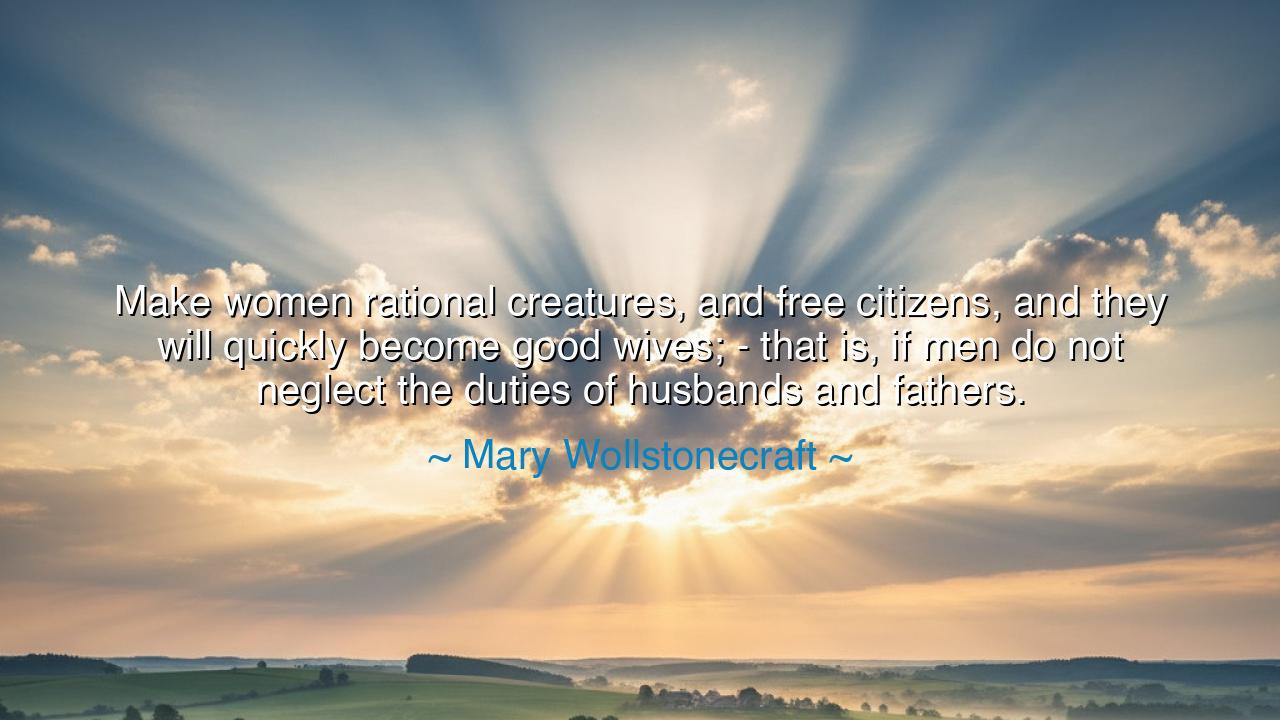
Make women rational creatures, and free citizens, and they will
Make women rational creatures, and free citizens, and they will quickly become good wives; - that is, if men do not neglect the duties of husbands and fathers.






"Make women rational creatures, and free citizens, and they will quickly become good wives; that is, if men do not neglect the duties of husbands and fathers." These words of Mary Wollstonecraft, a voice that echoed with the righteousness of reason and the clarity of justice, have reverberated through the corridors of time. In this statement, she does not merely speak of equality; she speaks of the inherent power of education, the need for freedom, and the sacred balance between the roles of men and women in society. Her call is not to place blame, but to empower and enlighten, for she understands that the state of one’s mind—the ability to reason and to act as a free individual—determines the true nature of a person’s soul.
In the ancient world, there were those who believed that a woman’s mind was a delicate thing, incapable of the reason that drove the great thinkers of their time. Yet Socrates himself declared that wisdom is not bound by gender, and Plato spoke of the equality of souls in his teachings. But while the ancients laid the seeds of such wisdom, it was the voices of the enlightened few, like Wollstonecraft, who would carry it forward into the modern age. Rational creatures, she says, must be free to choose, to think, to act with the power that comes from knowledge. And in this freedom, women would rise not to fulfill a role dictated by tradition, but to become partners in the shaping of society.
But here lies the heart of her wisdom: that in empowering women, society as a whole flourishes. She does not speak of an isolated pursuit, but a mutual journey—a journey that requires both men and women to take on the responsibilities of their roles. To be a good wife, as she speaks of it, is not merely a role that can be imposed or expected. It is the result of a partnership, a union in which both parties engage with purpose and respect. Wollstonecraft teaches that when women are granted the tools of reason and the right to freedom, they can rise to meet their duties as wives and mothers—not out of subjugation or expectation, but out of shared respect and mutual growth.
Consider, if you will, the ancient legend of Penelope, wife of Odysseus. Penelope, wise and patient, was not merely a passive figure waiting for her husband’s return. She embodied the strength of reason and self-determination, making decisions in her husband’s absence that preserved the integrity of her household and ensured the survival of her family. Her wisdom was not a passive trait, nor one dictated by circumstance, but one that allowed her to meet the demands of her position as wife and mother with strength and dignity. Penelope’s story, though rooted in mythology, serves as a beacon for Wollstonecraft’s plea: when a woman is given the tools to be rational and free, she will rise to meet the highest standards of courage and compassion.
Yet, Wollstonecraft does not solely place the burden on women. She makes it clear that men, too, must take on their duties—not only as husbands and fathers, but as companions and partners in the journey of life. The failure of one partner to uphold their end of the bargain poisons the well of the relationship. If men neglect their roles, if they abandon the sacred duties of support, respect, and mutual care, they undermine the very foundation upon which the family and society are built. Men, too, must be rational creatures—that is, they must act with reason, fairness, and responsibility in all their dealings.
Consider the great civilizations of old—Rome, Greece, Egypt—all of which were built upon the principle of partnership between men and women. In these societies, when both were given the opportunity to contribute, the result was progress, growth, and lasting legacies. But when that balance was lost, when one side was relegated to silence and subjugation, the civilizations themselves began to crumble under the weight of inequality. The lesson here is clear: a society is only as strong as the partnership between all its members. To neglect the duties of husbands, to silence the voices of women, is to build a house on shifting sand.
Thus, we must understand that Wollstonecraft’s wisdom is not just a call for the freedom of women; it is a call for a society grounded in equality, where both men and women rise to meet their duties with integrity and respect. Women must be allowed to reason, to be educated, and to engage in the affairs of the world. But men, too, must rise to meet their responsibilities—not as rulers, but as partners in the sacred bond of marriage and family.
Let us take this lesson into our own lives. The balance between men and women, between freedom and duty, is not something to be ignored. It must be actively cultivated. Each of us, whether man or woman, must be a rational creature, guided by reason and wisdom, and we must share the duties that come with our roles in life. For it is only when we act as true equals, when we support one another with love and respect, that we can build a world worthy of our highest aspirations. So, men, be the husbands and fathers you are meant to be. Women, take the seat at the table of reason that is rightfully yours. Only then can we create a society that is truly just, equitable, and worthy of the greatness we are all capable of achieving.






AAdministratorAdministrator
Welcome, honored guests. Please leave a comment, we will respond soon